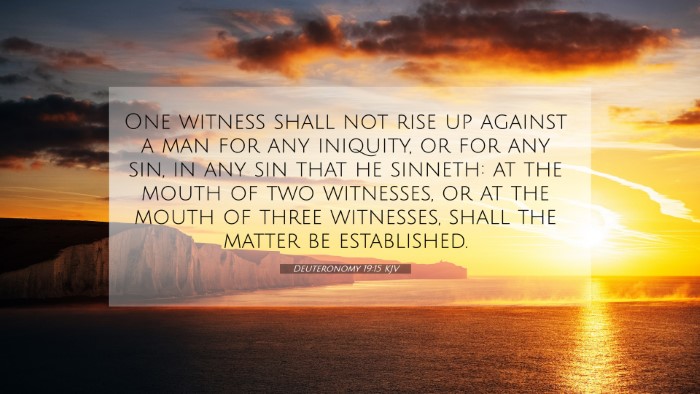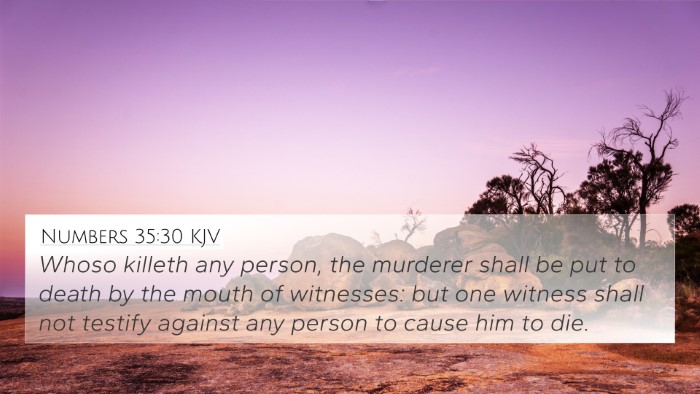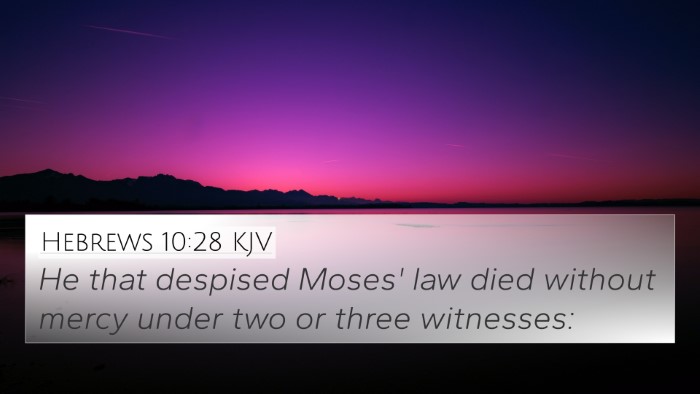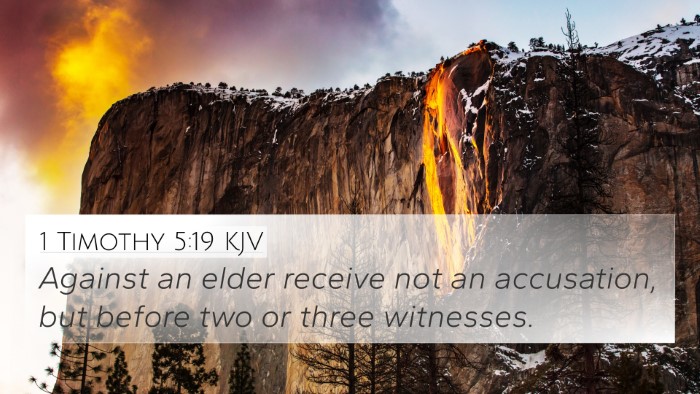Understanding Deuteronomy 19:15
Verse Reference: Deuteronomy 19:15 states, "One witness shall not rise against a man concerning any iniquity or any sin that he commits; by the mouth of two or three witnesses the matter shall be established." This verse lays the foundation for just legal proceedings in Israelite society, emphasizing the importance of multiple testimonies in establishing truth.
Meaning and Interpretation
The verse highlights several crucial principles regarding justice and testimony:
- Importance of Witnesses: This law stresses that a single witness is not adequate to convict someone of a crime. Matthew Henry notes that this serves to prevent false accusations and ensures fairness in judicial matters.
- Protection Against Falsehood: Albert Barnes points out that this statute was designed to protect individuals from wrongful convictions, promoting the integrity of witness testimonies.
- Legal System Foundation: Adam Clarke emphasizes the necessity of a credible legal system based on corroborated evidence, reflecting God's desire for justice among His people.
- Moral and Spiritual Application: While the context is legal, the principle extends to moral conduct; believers are encouraged to uphold truth and justice in their dealings with others.
Cross-References and Thematic Connections
This verse connects with various other scriptures that discuss the themes of justice, testimony, and truth:
- Matthew 18:16: "But if he will not hear you, take with you one or two more, that 'by the mouth of two or three witnesses every word may be established.'" This New Testament verse reaffirms the principle established in Deuteronomy.
- 1 Timothy 5:19: "Do not receive an accusation against an elder except from two or three witnesses." This later teaching highlights the continuity in valuing multiple testimonies within the church.
- John 8:17: "It is also written in your law that the testimony of two men is true." Jesus reinforces the significance of adequate witnesses in legal matters.
- 2 Corinthians 13:1: "This will be the third time I am coming to you. 'By the mouth of two or three witnesses every word shall be established.'" Paul reiterates this principle in the context of church discipline.
- Hebrews 10:28: "Anyone who has rejected Moses' law dies without mercy on the testimony of two or three witnesses." This emphasizes the gravity of a judicial statement under Mosaic Law.
- Proverbs 25:18: "A man who bears false witness against his neighbor is like a club, a sword, and a sharp arrow." This passage warns against the destructive power of false testimony.
- Exodus 20:16: "You shall not bear false witness against your neighbor." This is part of the Ten Commandments, which underlies the moral foundation of testimony in Israel.
Thematic Bible Verse Connections
By utilizing a bible concordance and bible cross-reference guide, scholars can identify comprehensive biblical themes that resonate throughout scripture. The following themes can be explored further:
- Justice: Examining verses related to fairness and righteousness.
- Truth: Analyzing scriptures that discuss the importance of truth in both personal and communal contexts.
- Community Integrity: Understanding how communal living is affected by the principles of justice and truth-telling.
- Divine Authority: Recognizing God’s role in the establishment of justice and how believers are called to mirror that quality in their lives.
How to Use Bible Cross-References
Tools for Bible cross-referencing can significantly enhance one’s understanding of scripture. Here are some methods to effectively use cross-references:
- Bible Study Groups: Engage in discussions that utilize cross-references to deepen understanding.
- Individual Study: Create personal notes linking verses that speak to specific themes or issues.
- Sermon Preparation: Pastors can find supporting verses to enrich their messages, using an bible cross-reference system.
Conclusion
The insights from Deuteronomy 19:15 provide a compelling framework for understanding legal justice and personal integrity in a biblically informed way. By exploring connections with related verses, one can cultivate a robust understanding of scriptural principles, engaging in a form of inter-Biblical dialogue that enriches both faith and practice.













